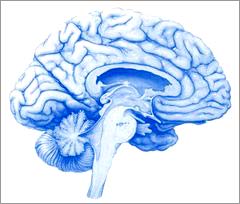Molecular detection of memory
American scientists at New York University have discovered that the molecular mechanism maintains the storage of memories in the brain. They demonstrated in Science that, when inhibiting a molecule
 In particular, they have erased long-term memories, similar to how one can delete a computer's hard drive.
In particular, they have erased long-term memories, similar to how one can delete a computer's hard drive.
Scientists have also demonstrated that deleting these memories does not hinder their ability to recover them in the same way as the re-use of a clean computer's hard drive. This finding may help find applications in the treatment of chronic pain, post-traumatic disorders and memory loss.
According to the researchers, the enzyme molecule entitled ' kinase M zeta protein ' (PKM zeta) helps to maintain long-term memory by continuously strengthening the connections between nerve cells. When inhibiting this enzyme, the scientists deleted the memories recorded in a day for up to a month. They demonstrated that this function is specific to PKM zeta enzymes, inhibiting other binding molecules does not affect memory.
Identifying the key molecular mechanism of memory storage can help identify specific pathogens that allow memory and memory loss. Since the beginning of this year, the scientists have also announced that PKM zeta is related to disorders of Alzheimer's disease that may be partly due to inhibited memory storage function.
WITH
- Hormone detection helps recall memory
- Scientists can create molecular-sized memories
- Memory process of the brain and methods to improve memory!
- Detection of B2M protein accumulates in the blood associated with memory impairment
- Detects tremors of memory and memory
- 'Curse' of those who remember everything
- The pen detects cancer for 10 seconds
- You can learn to possess super-powerful memory: remember 500 words in 5 minutes
- 10 year old discover new molecular structure
- Find out how to recover memory
- Listening or seeing helps you remember longer?
- Shocking discovery of monkey's memory
 Green tea cleans teeth better than mouthwash?
Green tea cleans teeth better than mouthwash? Death kiss: This is why you should not let anyone kiss your baby's lips
Death kiss: This is why you should not let anyone kiss your baby's lips What is salmonellosis?
What is salmonellosis? Caution should be exercised when using aloe vera through eating and drinking
Caution should be exercised when using aloe vera through eating and drinking